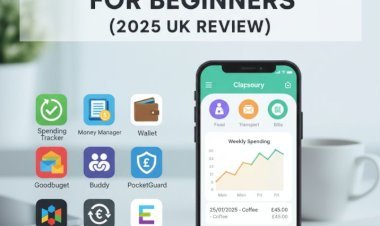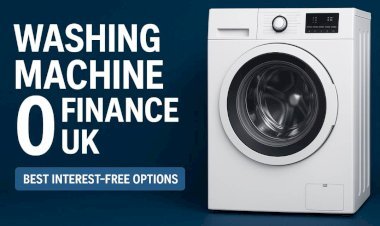Top 10 Best Rated Budget Apps in the UK (2025 Guide)
Discover the top 10 best rated budget apps in the UK for 2025. Learn how each app helps you track spending, manage accounts, and improve financial habits.

The best rated budget apps in the UK for 2025 include YNAB, Emma, Snoop and Monzo. These apps offer reliable spending insights, strong budgeting tools and secure links with major UK banks. YNAB provides structured budgeting, Emma handles automatic categorisation, Snoop offers money-saving insights and Monzo delivers built-in budgeting features.
Budgeting apps have become essential tools for UK users who want clearer control over their money in 2025. With rising living costs and the shift toward digital banking, people now rely on these apps to monitor spending, understand financial habits, and manage savings more confidently. Although many budgeting tools are available, only a select group consistently stands out for reliability, user-friendly design, and trusted features. This guide highlights ten of the most dependable and widely used budgeting apps in the UK, offering verified, stable information to help you choose a tool that genuinely improves everydaay financial management.
1. YNAB (You Need A Budget)
YNAB is widely recognised for its structured, zero-based budgeting philosophy, which encourages users to assign every pound a purpose before spending it. This approach has earned strong loyalty among users who want deeper control over their financial planning. YNAB offers bank syncing, goal tracking, comprehensive category planning, and real-time updates across devices.
Users who want a more detailed explanation of how the system works can read our complete guide here: ynab-budget-app , which covers the method and features in greater depth.
Many UK users appreciate how YNAB helps improve spending awareness and reduce unnecessary expenses. Its interface is detailed yet clear, which appeals to people who prefer a more organised method of budgeting. The app operates on a subscription model, and users gain access to a complete suite of budgeting features through that subscription.
2. Emma
Emma is designed specifically with UK banking in mind, making it one of the most relevant budgeting apps for UK users. It connects with a wide range of UK banks through Open Banking and automatically categorises user transactions. The app highlights patterns, identifies subscriptions, and provides helpful insights into spending behaviour.
One of Emma’s strengths is the clarity of its interface. Users can easily navigate through categories, savings suggestions, and monthly summaries. The app offers a free version with essential features, while additional insights and tools are available through its premium upgrade. Because of its bank compatibility and modern design, Emma is widely used by people who want an effortless budgeting experience tailored to UK financial habits.
3. Snoop
Snoop focuses heavily on providing intelligent, personalised money insights. Instead of only tracking spending, it looks for opportunities to help users save money, whether by spotting overpriced bills, unnecessary subscriptions, or changes in spending patterns. Snoop connects securely to major UK banks through Open Banking, allowing the app to monitor spending in real time.
The app’s weekly spending summaries are particularly helpful for users who want to stay aware of how their habits shift from week to week. Snoop’s suggestions are practical and easy to follow, which makes it appealing for people who want both tracking and financial guidance without needing to set up complex budgets.
4. Monzo
Monzo is best known as a UK digital bank, but its budgeting tools are widely praised for their simplicity and reliability. Users receive instant notifications after every transaction, along with automatic spending categorisation. Monzo’s “pots” feature allows users to set money aside for bills, savings, holidays, and other financial goals.
Because budgeting is integrated directly into the bank account, Monzo removes the need for an additional budgeting app. Many users prefer this all-in-one experience, especially those who want to manage spending and saving without switching between platforms. Its budgeting functions are not as advanced as dedicated tools like YNAB or Emma, but they serve everyday needs efficiently and clearly.
5. Money Manager
Money Manager is known for its clean design and strong visual representations of financial activity. It appeals to users who want a straightforward budgeting method without the complexity of advanced financial features. The app displays spending patterns through charts and diagrams and organises categories in a way that makes them easy to understand at a glance.
One of its strengths is its ability to export data to Excel, making it practical for users who prefer maintaining long-term financial histories outside the app. Money Manager also offers cross-device syncing, which helps users update their budget on multiple devices. Although it is not UK-specific in design, it remains one of the most widely used general budgeting tools.
6. Monefy
Monefy is built for speed and simplicity. It focuses on making it easy for users to record daily transactions with minimal effort. Instead of offering deep analytics or advanced planning tools, the app provides straightforward categories and a clear view of how money is spent across different areas.
Many UK users choose Monefy because it removes complexity. People who need a daily expense tracker rather than a full financial planning system often find Monefy ideal. The interface is clean, the categories are easy to navigate, and users can monitor spending without dealing with detailed configurations. Although it lacks automatic bank syncing, its simplicity is a major part of its appeal.
7. Goodbudget
Goodbudget is based on the envelope budgeting method, which divides money into different expense categories at the start of each month. This method encourages intentional spending and is especially useful for couples and families who want shared financial transparency.
Unlike apps that rely heavily on bank syncing, Goodbudget requires most entries to be added manually. Despite that, it remains widely used by people who appreciate the discipline of envelope budgeting. It offers cloud syncing and multi-device support, which makes it easy for families to collaborate on their finances. Goodbudget is often chosen by people who value structure and prefer to be actively involved in their financial tracking.
8. Wallet
Wallet is a polished budgeting app that supports multi-account management and long-term financial reflection. Users can link accounts, monitor spending patterns, and understand how their finances evolve over time. Wallet’s interface is modern and clean, making it appealing to people who enjoy visually clear financial summaries.
The app also supports shared accounts, which is helpful for couples or households managing joint budgets. While some enhanced features require a subscription, the core budgeting tools offer strong value for everyday financial tracking. Wallet is especially appealing for users managing multiple accounts across different banks.
9. My Budget Book
My Budget Book offers a more professional, ledger-style budgeting experience. It is popular among users who prefer detailed categorisation and long-term financial documentation. The app allows significant customisation of categories and supports exporting data to spreadsheet files for those who like maintaining financial records separately.
While the interface is more traditional compared to newer apps, it provides a depth of control that appeals to users who want precise financial monitoring. My Budget Book does not rely on automation or bank syncing, making it suitable for users who prefer manual entry or offline-style budgeting.
10. AndroMoney
AndroMoney is a popular budgeting tool for users who want a simple, efficient way to record spending across multiple categories. It supports several account types and offers clear real-time breakdowns of spending. The interface is clean and straightforward, helping users see their financial patterns with minimal effort.
Although it does not include UK-specific features or automatic bank syncing, it remains one of the most widely used general budgeting apps on Android. Its combination of simplicity and accuracy makes it suitable for people looking for reliable daily expense tracking.
How These Apps Compare
The UK’s top budgeting apps offer different strengths. YNAB provides one of the strongest structured approaches for people who want complete financial planning. Emma and Snoop focus on automatic tracking and personalised insights, making them ideal for users who prefer low-effort budgeting. Monzo’s integrated banking features make it a natural choice for users who prefer keeping their financial activity in one place.
Apps like Money Manager, Monefy, Wallet, My Budget Book, and AndroMoney appeal to people who want flexibility, simplicity, or a more manual approach. Because financial needs differ from person to person, UK users benefit from having a wide selection of apps tailored to different budgeting styles.
How to Choose the Best Budgeting App
Choosing the right budgeting app depends on your personal financial habits. If you prefer automation and want the app to handle categorisation and insights, tools like Emma, Snoop, Monzo, and YNAB are strong options. Users who prefer creating their budgets manually may find Money Manager, Monefy, Goodbudget, or My Budget Book more suitable.
People who manage shared expenses might prefer Wallet or Goodbudget, while those who want flexible long-term reporting may lean toward Money Manager or AndroMoney. The right choice depends on whether you prioritise automation, simplicity, collaboration, or detailed financial control.
Conclusion
Choosing the right budgeting app depends on your financial habits, the level of automation you prefer and whether you want simple tracking or a complete planning system. YNAB offers the most structured approach, Emma stands out for UK bank compatibility, Snoop provides practical money-saving insights and Monzo delivers budgeting built into everyday banking. Tools like Money Manager, Monefy, Wallet, My Budget Book and AndroMoney remain reliable for users who prefer manual control. Each app included in this guide is trusted, secure and widely used across the UK, helping you manage spending more confidently in 2025.
FAQs
1. What is the best rated budget app in the UK?
Several apps are highly regarded in the UK, including YNAB, Emma, Snoop and Monzo. Each offers secure spending insights, budgeting tools and reliable connections with major UK banks.
2. Which budgeting app is the easiest for beginners?
Many beginners prefer Monefy or Money Manager because they offer simple layouts, clear categories and effortless ways to record daily expenses.
3. Which budgeting app works best with UK banks?
Apps built around Open Banking, such as Emma, Snoop and Monzo, offer strong compatibility with leading UK banks and provide reliable real-time transaction updates.
4. What is the best free budgeting app in the UK?
Emma offers one of the strongest free versions for UK users, with automatic categorisation and spending insights. Free versions of Monefy and Snoop are also popular.
5. Which budgeting app is best for couples or households?
Goodbudget and Wallet are commonly chosen by couples because they allow shared access and collaborative tracking of joint expenses and monthly budgets.
6. Which budgeting app is best for people who prefer manual tracking?
Users who want hands-on control often choose Money Manager, My Budget Book or AndroMoney, as these apps focus on manual entry, category customisation and clear spending reports.
7. What is the best budgeting app for long-term planning?
YNAB is widely used for long-term financial planning because its structured method encourages goal setting, intentional spending and clear monthly reviews.
8. Can I use budgeting apps without linking my bank account?
Yes. Apps such as Monefy, Money Manager and My Budget Book allow full manual entry, making them suitable for users who prefer privacy or offline tracking.
9. Which budgeting app helps reduce monthly spending?
Snoop is well known for identifying overpriced bills, unused subscriptions and unnecessary charges, helping users make immediate savings.
10. What is the best budgeting app for tracking subscriptions?
Emma provides strong subscription detection, helping users find forgotten services and recurring payments that affect their monthly budget.

 AnniWeston
AnniWeston 











